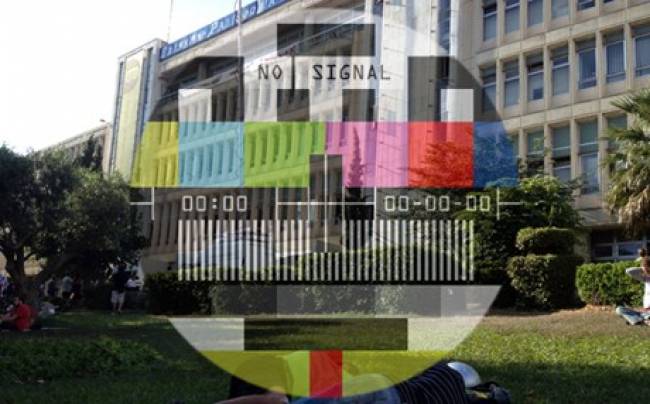This Revolution Cannot be Televised: on the closure of E.R.T. in Greece


There was no conspiracy, there was no coup, there wasn’t even any suspension of the law in the name of the law, no state of emergency. The closing down of the Greek national broadcaster, ERT, was nothing more than an ordinary item on the political agenda of a socially defiant, semiologically indifferent, politically pompous and idiosyncratically reckless Prime Minister.
Under the obscure banner of ‘streamlining’ and ‘restructuring’ in order to achieve ‘greater efficiency’ and kickstart ‘modernization’, all those hollow buzzwords from the darkest nightmares of neoliberal euphoria, the leader of the three-party coalition government in Greece blatantly shrugged off his peers’ disagreement over the issue, took matters in his own hands and in a gesture of melodramatic self-sacrificial political bravado pulled the plug on a network of radio and television channels that serves Greek-speaking (and not only) audiences in Greece and abroad.
The backstory, as it always happens, is a bit less illustrious: having failed miserably to achieve a favorable deal for the privatization of DEPA when the Russian colossus Gazprom pulled out of the impeding deal, Mr. Samaras found himself with more public servants and less money than he had promised his supervisors (the troika) and in desperate need of a bold move that would reassure them of his resolute and steadfast character. Enter ERT.
Following months of anti-statist bilge, where anything and everything ‘public’ is a priori indicted by the mainstream (read: privately owned) media outlets for being anachronistic, wasteful and deficient, where all public servants are collectively charged with being lazy, parasitic and corrupt, and where privatization and selling-off is presented not as a potentially preferable, but the only, alternative, the Greek PM, feeling warm and pepped in the cozy embrace of his autocratic rule was (and, by the looks of it, still is) confident he could pull that off too.
But people were not as fatigued and worn out by the constant parroting of his government’s and the troika’s catchphrases, the audacious fact-bending, the reprehensible ethics or the personal and social, financial and psychological humiliation, as he had predicted – or, hoped. Late at night on Tuesday, after ERT’s signal went down, they assembled around the main building and protested Samaras’s decision to deprive them of their national broadcaster – the stress being on ‘their’.
The journalists, technically already fired, continued doing their job and ERT’s signal was broadcast through various internet websites and eventually by the EBU. By Thursday morning, an electronic missive personally signed by the Minister for Finance, Yannis Stournaras, was delivered to all stations, adding insult to injury: it warned that re-transmission of ERT’s broadcast from any other station would be faced with sanctions.
Samaras, seemingly unperturbed by opposition from his ‘allies’, from swarms of citizens, from insubordinate public employees and from official European media and information institutions and regulatory bodies that are protesting his decision, is sternly refusing to back down and has made it clear that this is a personal bet he is not intending to lose: ERT will remain shut or the government will topple. As is well known, only idiots don't change their minds...
It is precisely this sort of political arrogance that has brought Greece to the critical state it is today. The explosive mixture that is Greece today is the result of barefaced disregard for democratic values in the name of ‘hard choices that need to be made’, of despotic ruling by officials who lack public recognition, support of legitimacy, of patronizing governing, of condescension, humiliation and wholesale repudiation. The mixture might soon ignite, and the spark will be the dreadful realization that all this will have also been, for nothing.
It is irrelevant how many Greeks actually watched ERT. A public broadcaster is not and cannot be an a la carte service, for the same old reasons that traffic lights, the police or schooling cannot become pay-as-you-use amenities. A public broadcaster is an end in itself and it must be protected as such. Discussions about the quality of ERT’s programs, the amount of advertising revenue they generated or its popularity are irrelevant and those engaging in them are deceitfully applying a commercial logic to a non-commercial enterprise.
The (domestic and international) outrage towards Samaras’s decision (and the personal reference is only because of his own insistence in making this a personal matter par excellence) is an outrage against the ever-increasing spectacles of vulgar indifference perpetrated by a discredited political elite against its own people. As such, it is not about ERT per se, it is not about Samaras per se, it is not even about Greece. It is about dignity and democracy – both of which people feel they are being deprived of.
Visit Counterpunch to read the article in full.
